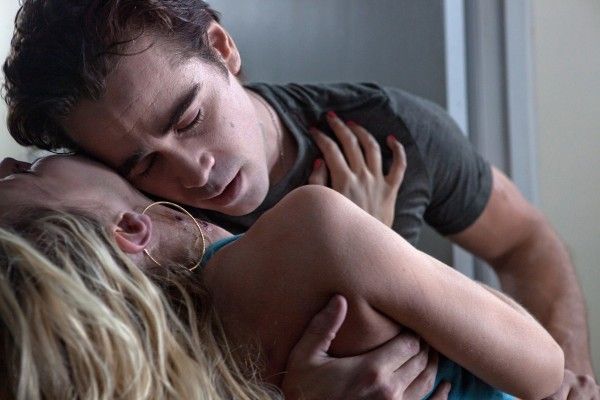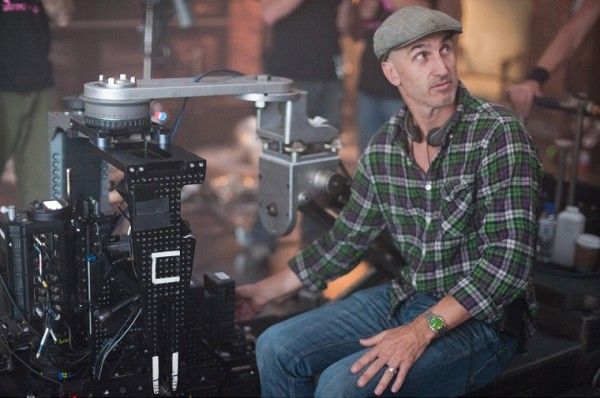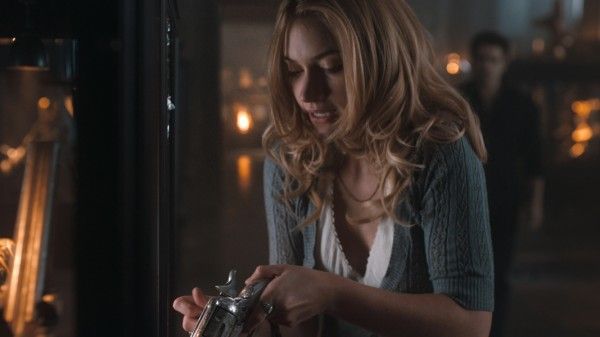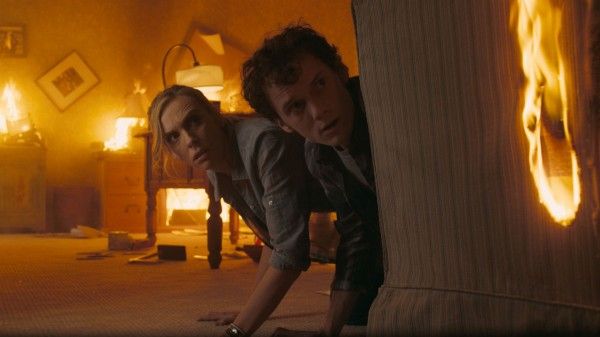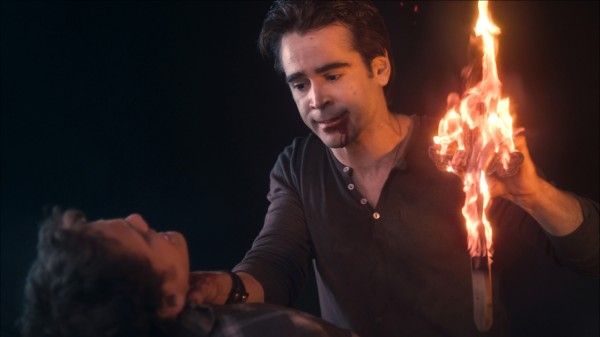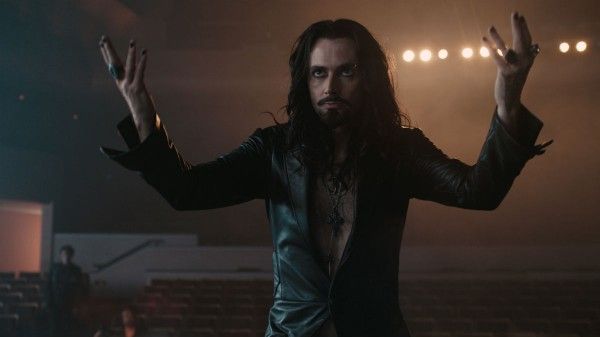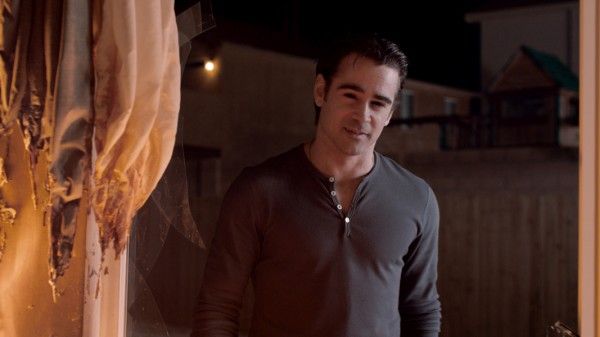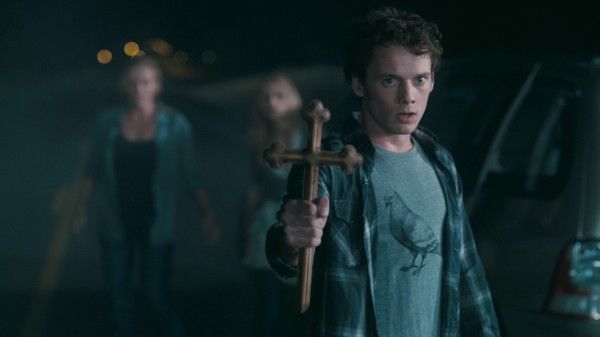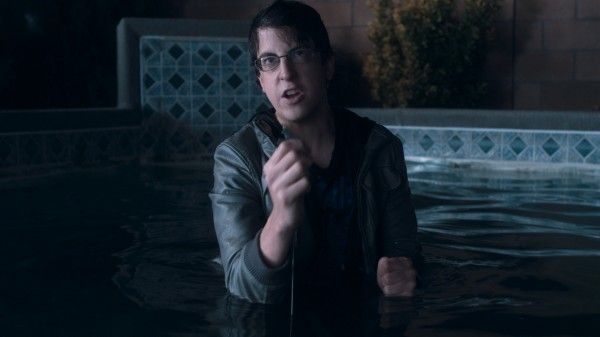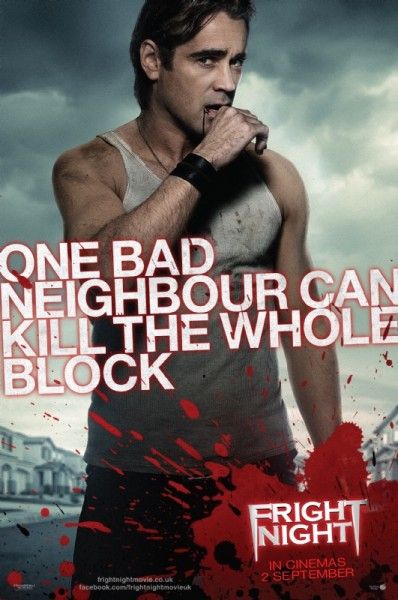Given our current cultural fascination with vampires, and the huge popularity of the Twilight Saga films, the timing seems appropriate for a re-imagining of the beloved 1985 horror classic Fright Night, marking a return of the vicious, murdering vampire. When intriguing stranger Jerry Dandrige (Colin Farrell) moves in next door to Charley Brewster (Anton Yelchin), he seems like a great guy, but something is clearly not quite right. At first, only Charley’s estranged best friend, Evil Ed (Christopher Mintz-Plasse), is convinced of the nefarious goings-on. As a result, Charley must take action to protect his mother (Toni Collette) and girlfriend Amy (Imogen Poots), and get rid of the monster himself, with a little advice and help from popular Las Vegas illusionist and self-proclaimed vampire expert Peter Vincent (David Tennant).
At the film’s press day, actor Colin Farrell and director Craig Gillespie talked about the hesitation of taking on what could have been an unoriginal remake, but instead is so much more fun, being a fan of the vampire genre, the complications of developing a backstory for a character that’s lived 400 years, working with Chris Sarandon (who played the original Jerry Dandrige), and playing with the vampire voice. Farrell also talked about his desire to maintain an eclectic career to keep himself guessing, and Gillespie talked about the appeal of his next project, Pride and Prejudice and Zombies. Check out what they had to say after the jump:
Question: Colin, being a fan of the original film, were you hesitant about taking this role on?
COLIN FARRELL: My initial reaction to it was, “Oh no, Hollywood unoriginality strikes again!”
CRAIG GILLESPIE: I said the same thing as well, but to Colin.
FARRELL: He said, “I’m going to end my career. Why don’t you join me?” And I said, “But, I’ve tried to end mine so many times.” I loved it, and I was worried about the notion of being involved. The ego doesn’t want to be involved in remakes because then people go, “Remakes? That’s unoriginal and that’s uncool.” I don’t want to be as easy a target. I like to make myself as unobvious a target as possible. This was a remake of something that I knew was loved and held in such high nostalgic esteem. When I saw it for the first time, when I was 10 or 11 or 12, I loved it. I’ve seen it anywhere between 10 and 20 times. And then, I read the script and, from page one until the end, it was just a really fun read. I was looking to do something that a little bit lighter than the dramatic films that I’d done, whether it was Triage, Ondine, In Bruges or Pride and Glory. They were so much fun, but I wanted to go and have a bit of crack, and not be constrained by an emotional or psychological background, or any of those things. I knew I was being thought of for Jerry, so when I read it, I was like, “God, it’s so much fun.” And, I knew Craig [Gillespie] was directing it, and I’d seen Lars and the Real Girl, so I thought he was a really cool choice for this film. It all fell on who the director was. It was dangerous to visit this material. I loved the original. I do hope those who liked the original, like this film. I really do.
GILLESPIE: If they don’t, there’s nothing you can do.
Colin, are you normally a fan of this genre?
FARRELL: I’ve loved vampire films, since I was young, with The Lost Boys, [Kathryn] Bigelow’s Near Dark and Fright Night itself, along with others, like many incarnations of the Dracula myth. I was seeped in the lore already, that made the idea of playing a vampire really attractive to me, as a fan. That’s how I approached it. Sometimes when you read them, as an actor, you approach them just as a human being, not as an actor, but just as a man or a woman, and you see how the piece affects you. With this, I really approached as a fan of film, and as a fan of this particular film. It was doubly hard to win me over because I was very dubious as to how wise it may be to revisit material that a lot of people felt was sacrosanct.
Did you do any research at all, to play this role?
FARRELL: Obviously, it’s tricky to do research. You can’t be walking down Third Street Promenade in Santa Monica and have a nibble on somebody’s neck. Maybe I did, back in the day.
Craig, how important was it for you to change the tone of this and make it less campy?
GILLESPIE: The tone was in Marti’s script. She had this great mix of the horror, the thriller and the action set pieces, and then there’s humor peppered in there. From the beginning, I always said to the studio, “I want this to be scary first, and then we’ll have humor secondary.” That was always the predominant thing, and then from there, we would use the humor just to give it a break and diffuse the situation, and then get right back into it. Just having that opportunity to mix that tone was what was fun for me. Jerry was always somebody that put that tension on screen, and then we have the humor that you need to break that, every once in awhile. As much as Christopher [Mintz-Plasse] and David [Tennant] are very funny, their characters were always coming from a very real place. Everybody was really in that reality of what was going on. We have a great balance.
Colin, what was the backstory you developed for Jerry Dandrige?
FARRELL: When you’re human, you go out on a Friday night, or in the workplace, competition is everywhere and people are one-upping each other, and there’s a whole lot of human emotions. But, this guy is a vampire who seems to have this disdainful opinion of human beings and their gross passivity, and how they move through life and how they fall into all these very obvious structures. Jerry was just bored with being 400 years old. You try to write a backstory for a character like Jerry, and it’s 400 years, so you’re like, “He’s 400 years old, so what kind of accent does this guy have? He’s from fucking Macedonia!” You can really do a number on yourself. There was one take where I got all of that in there, but we decided that it was just too much.
GILLESPIE: I just felt that it put him through so much to get there.
FARRELL: So, you mess around with backstory. He probably was a little bit bored, so he was pushing the envelope, which explained certain behaviors that I found it hard to rationalize, like the motorbike and the blowing up of the house, and that drawing of attention. His preternatural skill allows him to get out of any jam. Even if the fucking National Guard descended on him, he’d be up in the air and sitting in a cave in Venezuela, in the space of a couple of hours. You’re unbound by this mortal logic that we all live in. This guy is pretty bored with the tedium of life. He really sees Charley as a challenge, and he’s enjoying the game. He’s like a cat with a ball of wool.
GILLESPIE: Even some of the set pieces in the movie would inform his motivation and his backstory. Some of that primal stuff happens because he needs to trigger his primal need.
FARRELL: He’s an adrenalin junkie. The scent of somebody else’s fear is what Jerry needed to physically work himself up. It wasn’t just a matter of biting. For the fangs to even appear, there had to be some kind of a rage or some kind of a sense of arousal, in vampire form. You’d try to respect that conventions that were in place, as much as possible, and then write your own conventions around it.
Craig, when you think about horror films and vampire mythology, how did you update this film?
GILLESPIE: When I was growing up, one of my favorite horror films that I saw six times the first weekend was An American Werewolf in London. Back in the ‘80s, they just seemed to have this way of mixing the horror and the humor. For some reason, over the last 20 years, it’s grown to be either horror or comedy, and no meshing where you can actually be on the edge of your seat and then have a good laugh. That’s what attracted me to this.
With all the vampires in film and television, what is your favorite type of vampire?
GILLESPIE: That’s what was exciting about the script, right off the bat. This guy is truly a horrifying character. We really tried to come from that grounded place where we treat him a little bit more like he is this pathological serial killer. He’s been living in this environment for 400 years and he’s got to feed on human blood. How does he go about keeping people and not being detected? On top of that, he’s got this charm and charisma that seduces people, but at the end of the day, he’s detached from emotion.
Colin, what are the similarities and differences between the new Jerry Dandrige and the old one?
FARRELL: They both need blood to survive. The old Jerry Dandrige, as I remember him from when I was 11 or 12, was incredibly debonaire, had a certain dignity to him, felt like an intellectual, felt incredibly cultured and was suave. My guy was none of those things. He felt more like a social parasite. He felt like somebody who really did enjoy the threat that he posed to those around him, if he exposed himself to those around him, or allowed those around him to know who he was. My guy would be nothing without the fear that he could instill in people. He felt like he was somebody that treated humans like a cat treats a ball of wool, as not just a source of sustenance, but as playthings. He was brutal. I got the chance to play a brutal vampire, who wasn’t really concerned with anything. He wasn’t concerned with love, he had no fear and he had no human virtues that would be recognized. He was just somebody who traveled the world for 400 years and possibly got tired of his own company, but was violent and brutal, and very much had the M.O. of a serial killer.
How much fun was it for you to do the scene with Chris Sarandon?
FARRELL: Oh, it was loads of fun! It was a cool benediction. At least, that’s the way I took it. It was really nice that he had read the script and liked it, and he thought that Marti [Noxon] did a really good job of taking it in a new direction. From talking to him, I know that Chris’ experience on the original Fright Night is something that he still holds very dear to himself, and he’s still in touch with the other actors from it, and he still goes to Fright Night festivals. It’s played a very big part in his life. He had a vested interest in what we were going to do, so having him there to play that scene was great. I wish I had got to do more with him.
How did you decide which lines and behaviors you want to carry over from the original film?
GILLESPIE: “You’re so cool, Brewster!,” was originally in the script. Marti [Noxon] stuck that in, in just this very underhanded way, which was great. It wasn’t a big moment. It was just part of that scene. We had a few of those touches, along the way.
FARRELL: Yeah, and then there were other things that came up on the day. Jerry playing with the apple was a tip-of-the-head to Chris Sarandon being thrown the apple and catching it, as he came down the stairs. I had nobody to throw the fucking thing at me, so I had to do something else. I thought juggling with one apple would look ridiculous. We killed the juggling, thank god. That will be on the special features on the DVD.
Colin, is it true you played around with your vampire voice in between takes?
FARRELL: Whether it was The Count in Sesame Street or Gary Oldman in Coppola’s Dracula or Bella Lugosi, I had this idea of a sound hardwired into my head. I’d bring it into the takes, but it was wrong, so I’d have to get it out of my system. Either before or after I take, I’d just riff a couple of lines, in a mock-Transylvanian accent. The four-year-old in me was like, “No, do it this way,” and I was like, “Not really in front of the camera, little guy.” So, before or after the take, I did that a bit.
Will that be an extra on the DVD?
FARRELL: I hope not! They probably will.
GILLESPIE: Honestly, he was really generous, as an actor. Colin was creating a character, and you have to figure out where that tone of the character is. So, he would give a range of performances that we would explore. We just kept narrowing it down, as we went through the first couple of weeks, until where he ended up, with that balance of truly terrifying but charismatic predator.
Colin, after such a funny performance in Horrible Bosses, being so scary and menacing in Fright Night, and doing the action thing in Total Recall, what is it that interests you, in roles that you’re looking at now?
FARRELL: It’s that eclecticism. Genuinely, it’s really fun to experience, even in an imagined way with a pseudo-structure, other people’s lives, whether it’s historical figures, or everyday folks that we know and encounter on the streets and in our workplaces, or something like a vampire. It’s just a lot of fun to mix it up. I really don’t want to repeat myself. Not so much because I want to keep people guessing and shit, but because I want to keep myself guessing. This job that I do offers up such an opportunity to experience, through the imagination and the physical body as an instrument, different realities. At the end of the day, I get to go home to a hotel room. I’m not going to experience the reality of hardship that sometimes my characters live in. I’m very cautious about that. But, you do get to ask questions and put yourself in certain situation, even mentally, that you wouldn’t usually, and that’s loads of fun.
Has being a father now made you choose your movie roles more carefully?
FARRELL: Yeah, I like only playing savage killers now. I don’t know. Everything changes everything. I’m sure it’s informed my choices, in some way, but I don’t know the clear definition of what those ways would be.
Craig, why go from vampire to zombies, for Pride and Prejudice and Zombies?
GILLESPIE: It was just the script. I always respond to the script, firstly. I wasn’t looking to do that again. It got sent to me and I reluctantly picked it up. I just love mixing tones. It’s got humor and horror, but it’s a completely different style of humor in Pride and Prejudice.

